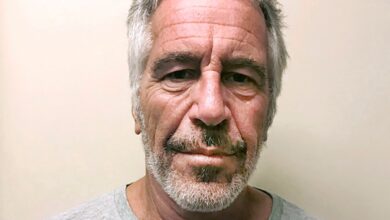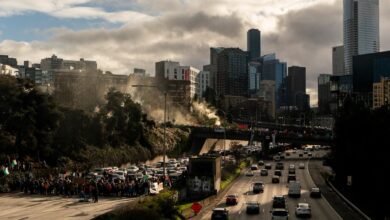The rise of the Wagner mercenary group – and what their success says about Putin’s invasion of Ukraine

An arm torn by shrapnel with rivulets of blood dripping down from the sleeve, a deep gash in a face caked with mud, limping after being dragged through the rubble – the Wagner fighter hardly looked like a menacing, cold-eyed killer of an elite mercenary outfit.
Talat Nazarbekov had been taken prisoner in the east Ukranian city of Bakhmut following an ambush and a firefight. Two comrades who also had been trying to infiltrate Ukrainian positions had been killed, their bodies lay nearby. Others, injured, had made it back to the Russian base.
The Wagner contingent on the frontline, said Talat, a young Uzbek, were running short of ammunition, supplies were not arriving, fire support they were promised had not materialised: morale was very low.
Parading the prisoner in front of me and another journalist, that is what his Ukrainian captors wanted to hear. This was precisely what their own intelligence suggested, they nodded sagely. “We are going to be taking back the areas Wagner have occupied, they are in poor shape, we are ready,” said a captain of the 93rd Brigade. “A lot of them will not live, this man is lucky we got him really. He will be taken to hospital for treatment.”
The Wagner fighter muttered wryly: “They will shoot me when you guys are gone”. He asked for a cigarette. Lighting him one, a Ukrainian soldier grinned. “We should put you out of your misery, but don’t worry, we are not going to,” he said. Talat, in the event, was not executed, I saw him a few days later at a hospital in Dnipro. But the Ukrainian advance did not take place either – both sides were stalled in attritional street fighting, gaining little.
Yevgeny Prigozhin, the boss of Wagner, was keen to dampen expectations back in Moscow at the time. “The situation near Bakhmut is difficult. The Ukrainian troops are putting up decent resistance, and the legend of the fleeing Ukrainians is just a legend,” he said in a Telegram post. “Ukrainians are guys with the same iron balls as us”.
Three months on, Wagner-led Russian forces have at last make a breakthrough in the Donbas, taking over most of the salt-mining town of Soledar, north of Bakhmut, giving them a strategic leverage as well as a propaganda victory. While fighting continues, the gains are the Kremlin’s only battlefield success since the summer.
As they moved through the town to secure a network of underground tunnels, the Wagner group said they had found the body of one of two men from Britain – 48 year old Andrew Bagshaw and Chris Parry, 28 – who have been missing in the area, although they did not name which one.
The gains in Soledar have added to the claims by Prigozhin that his men are a far more effective force than many of Moscow’s regular military units. There are currently 50,000 of the company’s mercenaries in Ukraine, some of them recruited from prisons, comprising a quarter of total Russian strength – more are being prepared for deployment in the near future.
Prigozhin, nicknamed “Putin’s chef” due to his ownership of a catering business with Russian government contracts, is a long-term confidante of the Russian president. He had been relatively low-profile while Wagner had deployed on behalf of the Kremlin in arenas including Libya, Syria, the Central Africa Republic, and recently Mali.
Over the last few months, however, Prigozhin has repeatedly sought the limelight, attacking the Kremlin military hierarchy over strategy and tactics, with Ukraine having made steady progress in the field as Russian forces faltered. He has been joined in the strident criticism by Ramzan Kadyrov, the Chechen ruler, whose troops are also in Ukraine. As well as some of Russia’s hawkish and influential military bloggers.
Kadyrov has praised Prigozhin – his “dear brother” – and advised his fighters, who number 20,000 overall and are formally a part of Rosgvardiya, the Russian National Guard, to pay “close attention” to what the Wagner chief has to say.
The frequency with which senior Russian officers have been moved during the Ukraine invasion indicates that President Putin continues to be dissatisfied with the way it is being run. The latest to be replaced is General Sergei Surovikin, who lost his role as head of what Moscow calls its “special military operation” to General Valery Gerasimov, the country’s military chief, after just three months.
Surovikin, a former commander of Russia’s Air Force, had been lauded by the pro-Kremlin media as “General Armageddon” for his aggressive strategy in Syria, including the pulverising bombing of Aleppo. The campaign of hitting Ukraine’s civilian infrastructure was initiated by the general. However, the damaging effect of that lessened with more drones and missiles being intercepted before they reach their targets.
Russia’s Defence Ministry said the appointment of General Gerasimov was to ensure “closer contact between different branches of the armed forces and improving the quality and effectiveness of the management of forces.”
Members of the 43rd Heavy Artillery Brigade in the Ukranian army fire near Soledar
There have, however, been reports of disagreements between Surovikin and Gerasimov – as well as the defence minister, Sergei Shoigu. In this internal power struggle Prigozhin has been a supporter of Surovikin and a critic of Shoigu.
The boss of Wagner has many enemies in Moscow, and they are believed to have been behind negative stories which have surfaced recently. The most prominent has been tales about Prigozhin’s time in prison while he was serving a 13 year sentence on charges of aggravated burglary and robbery .
In one video, a man, covered in prison tattoos and calling himself Sasha Kurara, claimed Prigozhin was his “b****” and that of other gangland heads while incarcerated. “He knew his place and agreed to his place,” said the supposed crime boss.
Prigozhin’s allies have sought to dismiss the allegations as smears – an indication of how those who oppose him are worried by his growing power.
Yevgeny Prigozhin, top, serves food to then-Russian Prime Minister Vladimir Putin at Prigozhin’s restaurant outside Moscow in 2011





